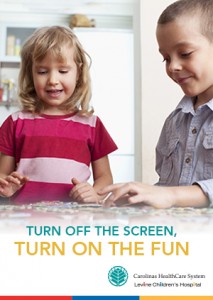This is the second in a series we’re working on with Levine Children’s Hospital as part of their Healthy Together initiative, a healthy lifestyles campaign with Carolina Panthers quarterback Cam Newton. We asked Dr. Kasey Scannell, pediatrician at Charlotte Pediatric Clinic, for her insights into kids and screen time. In case you missed our first in this series, click here for Dr. Ana-Maria Temple’s advice on healthy eating and kids.
Just to clear things up, what does the Academy of Pediatrics recommend for screen time for children (probably different recommendations for different ages)? How does this recommendation fit in with the 5210 tenants?
5210 recommends no more than two hours of recreational screen time a day, which is a great guideline for periods of down time during the day. However, the AAP recently altered their approach to screen time use due to the fact that media activity has become so universal. The recommendations shifted to a focus on high-quality content rather than time spent on screens. Adults are encouraged to act as a parent in their child’s media environment. This includes monitoring your child’s online identity as well as setting limits when screen time is proving distracting or unhealthy.
Be a good role model on proper media use. Parents should also engage in screen time with their child – try watching your child’s favorite show with them and have a discussion. Seek learning opportunities online. The recommendations also encourage screen-free zones within your home to emphasize the importance of quality family time. Allow time for “unplugging.”
What are some of the dangers of too much screen time for school-age children?
One of the most concerning aspects of screen time for school aged children is the exposure. A child’s ability to maneuver online can easily surpass their maturity level. He may start by reading a book online and quickly move into inappropriate YouTube videos.
In addition, how children use media at a young age can set the stage for future use. Bad habits can readily develop in regards to unhealthy media use. Lastly, cyberbullying and online predators remain a danger for vulnerable kids.
Does too much screen time directly affect kids’ health?
Excessive screen time has been linked to multiple health problems in children including attention issues and sleep disorders. LED light can mimic natural light and delay the release of melatonin (our natural hormone that induces sleepiness). Obesity and eating disorders have been associated with screen time due to endless snacking during sessions coupled with inactivity. Media use may expose children to high risk behaviors with information on substance abuse, sexual activity and self harm. Lastly, depression and anxiety have been linked to social media use.
Oftentimes middle school and high school kids have screen time during school hours plus screen time at home for homework. Is recreational screen time an absolute no-no after so much educational screen time?
The AAP recommendations are in regards to “entertainment media.” Oftentimes media use can be a source of fun and relaxation for children and families. Recreational screen time should absolutely be allowed outside of homework screen time. Parents should regulate based on individual family needs.
Smart phones and computers aren’t going away. How can we as parents use these tools to benefit our kids rather than hurt them?
The most important thing a parent can do to is to be a great role model on how to use media responsibly. Parents should unplug as well. Consider putting all phones and tablets away for an hour a night. We cannot expect our children to limit their use if we cannot disengage from email and texting ourselves. Lastly, recognize how engaging screen time can be. Use it a way to connect with your child. Have fun.
![]()
More from Levine Children’s Hospital on their Healthy Together initiative
Healthy habits are important for the whole family. For a smart game plan to get you there, follow 5-2-1-0. Every day, eat at least 5 servings of fruits and vegetables, limit screen time from TVs, video games, smartphones and other devices to 2 hours or less, get at least 1 hour of physical activity, and aim for 0 sugary drinks, drinking water or low-fat milk instead. To learn more about 5-2-1-0, access fun health tips and activities, and pledge to be healthy together with your family. Take the pledge and join the 5-2-1-0 League of healthy families in our community!
![]()
Dr. Kasey Scannell is married to pediatric orthopedic surgeon Dr. Brian Scannell and is mother to two young  daughters. A native of Marietta, GA, Dr. Scannell received her undergraduate degree from Vanderbilt University and her medical degree from UNC-Chapel Hill. When she’s not busy balancing an active family and work life, Dr. Scannell is probably watching college football :-). Thank you, Dr. Scannell, for all of your insights!
daughters. A native of Marietta, GA, Dr. Scannell received her undergraduate degree from Vanderbilt University and her medical degree from UNC-Chapel Hill. When she’s not busy balancing an active family and work life, Dr. Scannell is probably watching college football :-). Thank you, Dr. Scannell, for all of your insights!
Dr. Kasey Scannell
Charlotte Pediatric Clinic
Levine Children’s Hospital
Facebook
Instagram
Twitter
Pinterest



